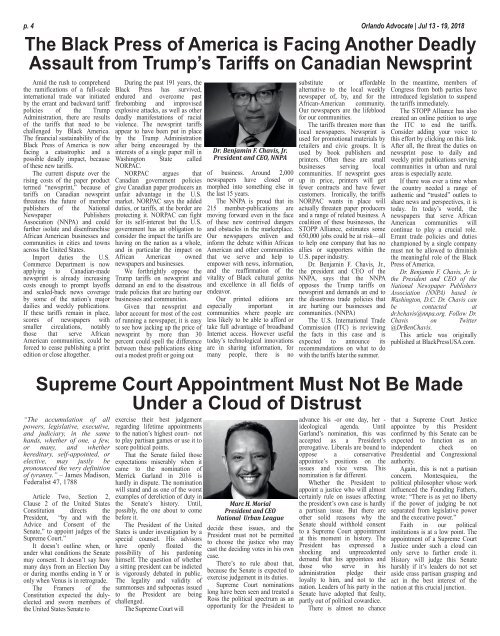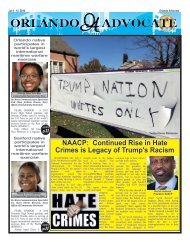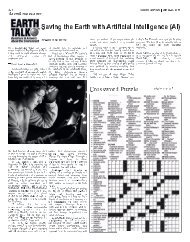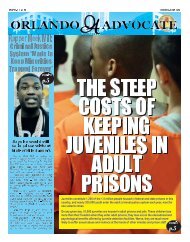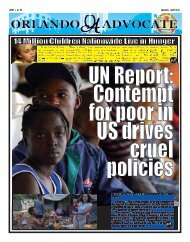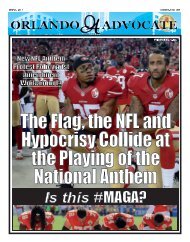2018-07-13
Create successful ePaper yourself
Turn your PDF publications into a flip-book with our unique Google optimized e-Paper software.
p. 4 Orlando Advocate | Jul <strong>13</strong> 19, <strong>2018</strong><br />
The Black Press of America is Facing Another Deadly<br />
Assault from Trump’s Tariffs on Canadian Newsprint<br />
Amid the rush to comprehend<br />
the ramifications of a fullscale<br />
international trade war initiated<br />
by the errant and backward tariff<br />
policies of the Trump<br />
Administration, there are results<br />
of the tariffs that need to be<br />
challenged by Black America.<br />
The financial sustainability of the<br />
Black Press of America is now<br />
facing a catastrophic and a<br />
possible deadly impact, because<br />
of these new tariffs.<br />
The current dispute over the<br />
rising costs of the paper product<br />
termed “newsprint,” because of<br />
tariffs on Canadian newsprint<br />
threatens the future of member<br />
publishers of the National<br />
Newspaper<br />
Publishers<br />
Association (NNPA) and could<br />
further isolate and disenfranchise<br />
African American businesses and<br />
communities in cities and towns<br />
across the United States.<br />
Import duties the U.S.<br />
Commerce Department is now<br />
applying to Canadianmade<br />
newsprint is already increasing<br />
costs enough to prompt layoffs<br />
and scaledback news coverage<br />
by some of the nation’s major<br />
dailies and weekly publications.<br />
If these tariffs remain in place,<br />
scores of newspapers with<br />
smaller circulations, notably<br />
those that serve African<br />
American communities, could be<br />
forced to cease publishing a print<br />
edition or close altogether.<br />
During the past 191 years, the<br />
Black Press has survived,<br />
endured and overcome past<br />
firebombing and improvised<br />
explosive attacks, as well as other<br />
deadly manifestations of racial<br />
violence. The newsprint tariffs<br />
appear to have been put in place<br />
by the Trump Administration<br />
after being encouraged by the<br />
interests of a single paper mill in<br />
Washington State called<br />
NORPAC.<br />
NORPAC argues that<br />
Canadian government policies<br />
give Canadian paper producers an<br />
unfair advantage in the U.S.<br />
market. NORPAC says the added<br />
duties, or tariffs, at the border are<br />
protecting it. NORPAC can fight<br />
for its selfinterest but the U.S.<br />
government has an obligation to<br />
consider the impact the tariffs are<br />
having on the nation as a whole,<br />
and in particular the impact on<br />
African American owned<br />
newspapers and businesses.<br />
We forthrightly oppose the<br />
Trump tariffs on newsprint and<br />
demand an end to the disastrous<br />
trade policies that are hurting our<br />
businesses and communities.<br />
Given that newsprint and<br />
labor account for most of the cost<br />
of running a newspaper, it is easy<br />
to see how jacking up the price of<br />
newsprint by more than 30<br />
percent could spell the difference<br />
between these publications eking<br />
out a modest profit or going out<br />
of business. Around 2,000<br />
newspapers have closed or<br />
morphed into something else in<br />
the last 15 years.<br />
The NNPA is proud that its<br />
215 memberpublications are<br />
moving forward even in the face<br />
of these new contrived dangers<br />
and obstacles in the marketplace.<br />
Our newspapers enliven and<br />
inform the debate within African<br />
American and other communities<br />
that we serve and help to<br />
empower with news, information,<br />
and the reaffirmation of the<br />
vitality of Black cultural genius<br />
and excellence in all fields of<br />
endeavor.<br />
Our printed editions are<br />
especially important in<br />
communities where people are<br />
less likely to be able to afford or<br />
take full advantage of broadband<br />
Internet access. However useful<br />
today’s technological innovations<br />
are in sharing information, for<br />
many people, there is no<br />
substitute or affordable<br />
alternative to the local weekly<br />
newspaper of, by, and for the<br />
AfricanAmerican community.<br />
Our newspapers are the lifeblood<br />
for our communities.<br />
The tariffs threaten more than<br />
local newspapers. Newsprint is<br />
used for promotional materials by<br />
retailers and civic groups. It is<br />
used by book publishers and<br />
printers. Often these are small<br />
businesses serving local<br />
communities. If newsprint goes<br />
up in price, printers will get<br />
fewer contracts and have fewer<br />
customers. Ironically, the tariffs<br />
NORPAC wants in place will<br />
actually threaten paper producers<br />
and a range of related business. A<br />
coalition of these businesses, the<br />
STOPP Alliance, estimates some<br />
650,000 jobs could be at risk—all<br />
to help one company that has no<br />
allies or supporters within the<br />
U.S. paper industry.<br />
Dr. Benjamin F. Chavis, Jr.,<br />
the president and CEO of the<br />
NNPA, says that the NNPA<br />
opposes the Trump tariffs on<br />
newsprint and demands an end to<br />
the disastrous trade policies that<br />
are hurting our businesses and<br />
communities. (NNPA)<br />
The U.S. International Trade<br />
Commission (ITC) is reviewing<br />
the facts in this case and is<br />
expected to announce its<br />
recommendations on what to do<br />
with the tariffs later the summer.<br />
In the meantime, members of<br />
Congress from both parties have<br />
introduced legislation to suspend<br />
the tariffs immediately.<br />
The STOPP Alliance has also<br />
created an online petition to urge<br />
the ITC to end the tariffs.<br />
Consider adding your voice to<br />
this effort by clicking on this link.<br />
After all, the threat the duties on<br />
newsprint pose to daily and<br />
weekly print publications serving<br />
communities in urban and rural<br />
areas is especially acute.<br />
If there was ever a time when<br />
the country needed a range of<br />
authentic and “trusted” outlets to<br />
share news and perspectives, it is<br />
today. In today’s world, the<br />
newspapers that serve African<br />
American communities will<br />
continue to play a crucial role.<br />
Errant trade policies and duties<br />
championed by a single company<br />
must not be allowed to diminish<br />
the meaningful role of the Black<br />
Press of America.<br />
Dr. Benjamin F. Chavis, Jr. is<br />
the President and CEO of the<br />
National Newspaper Publishers<br />
Association (NNPA) based in<br />
Washington, D.C. Dr. Chavis can<br />
be contacted at<br />
dr.bchavis@nnpa.org. Follow Dr.<br />
Chavis on Twitter<br />
@DrBenChavis.<br />
This article was originally<br />
published at BlackPressUSA.com.<br />
Supreme Court Appointment Must Not Be Made<br />
Under a Cloud of Distrust<br />
“The accumulation of all<br />
powers, legislative, executive,<br />
and judiciary, in the same<br />
hands, whether of one, a few,<br />
or many, and whether<br />
hereditary, selfappointed, or<br />
elective, may justly be<br />
pronounced the very definition<br />
of tyranny.” – James Madison,<br />
Federalist 47, 1788<br />
Article Two, Section 2,<br />
Clause 2 of the United States<br />
Constitution directs the<br />
President, “by and with the<br />
Advice and Consent of the<br />
Senate,” to appoint judges of the<br />
Supreme Court.”<br />
It doesn’t outline when, or<br />
under what conditions the Senate<br />
may consent. It doesn’t say how<br />
many days from an Election Day<br />
or during months ending in Y or<br />
only when Venus is in retrograde.<br />
The Framers of the<br />
Constitution expected the dulyelected<br />
and sworn members of<br />
the United States Senate to<br />
exercise their best judgement<br />
regarding lifetime appointments<br />
to the nation’s highest court not<br />
to play partisan games or use it to<br />
score political points.<br />
That the Senate failed those<br />
expectations miserably when it<br />
came to the nomination of<br />
Merrick Garland in 2016 is<br />
hardly in dispute. The nomination<br />
will stand and as one of the worst<br />
examples of dereliction of duty in<br />
the Senate’s history. Until,<br />
possibly, the one about to come<br />
before it.<br />
The President of the United<br />
States is under investigation by a<br />
special counsel. His advisors<br />
have openly floated the<br />
possibility of his pardoning<br />
himself. The question of whether<br />
a sitting president can be indicted<br />
is vigorously debated in public.<br />
The legality and validity of<br />
summonses and subpoenas issued<br />
to the President are being<br />
challenged.<br />
The Supreme Court will<br />
Dr. Benjamin F. Chavis, Jr.<br />
President and CEO, NNPA<br />
Marc H. Morial<br />
President and CEO<br />
National Urban League<br />
decide these issues, and the<br />
President must not be permitted<br />
to choose the justice who may<br />
cast the deciding votes in his own<br />
case.<br />
There’s no rule about that,<br />
because the Senate is expected to<br />
exercise judgement in its duties.<br />
Supreme Court nominations<br />
long have been seen and treated a<br />
Ross the political spectrum as an<br />
opportunity for the President to<br />
advance his or one day, her <br />
ideological agenda. Until<br />
Garland’s nomination, this was<br />
accepted as a President’s<br />
prerogative. Liberals are bound to<br />
oppose a conservative<br />
appointee’s positions on the<br />
issues and vice versa. This<br />
nomination is far different.<br />
Whether the President to<br />
appoint a justice who will almost<br />
certainly rule on issues affecting<br />
the president’s own case is hardly<br />
a partisan issue. But there are<br />
other solid reasons why the<br />
Senate should withhold consent<br />
to a Supreme Court appointment<br />
at this moment in history. The<br />
President has expressed a<br />
shocking and unprecedented<br />
demand that his appointees and<br />
those who serve in his<br />
administration pledge their<br />
loyalty to him, and not to the<br />
nation. Leaders of his party in the<br />
Senate have adopted that fealty,<br />
partly out of political cowardice.<br />
There is almost no chance<br />
that a Supreme Court Justice<br />
appointee by this President<br />
confirmed by this Senate can be<br />
expected to function as an<br />
independent check on<br />
Presidential and Congressional<br />
authority.<br />
Again, this is not a partisan<br />
concern. Montesquieu, the<br />
political philosopher whose work<br />
influenced the Founding Fathers,<br />
wrote: “There is as yet no liberty<br />
if the power of judging be not<br />
separated from legislative power<br />
and the executive power.”<br />
Faith in our political<br />
institutions is at a low point. The<br />
appointment of a Supreme Court<br />
Justice under such a cloud can<br />
only serve to further erode it.<br />
History will judge this Senate<br />
harshly if it’s leaders do not set<br />
aside crass partisan grasping and<br />
act in the best interest of the<br />
nation at this crucial junction.


